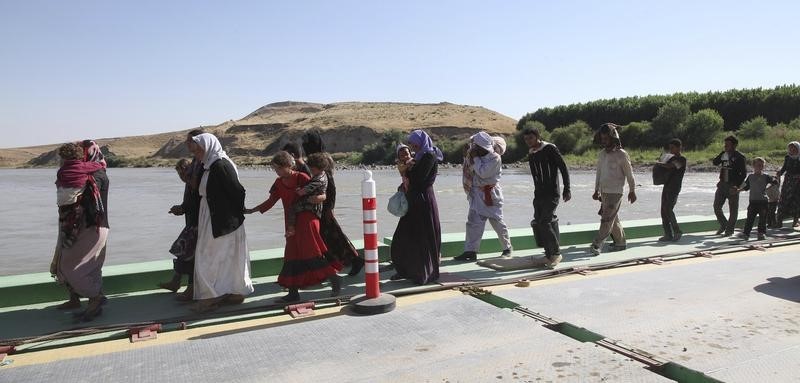By Sebastien Malo
NEW YORK (Thomson Reuters Foundation) - Soon after Iraqi lawyer Khaleel Aldakhi and his wife heard the chilling news that Islamic State militants were enslaving Yazidi women and children in Iraq, they began plotting a rescue mission from their home in the northern city of Dohuk.
During a 2014 visit to refugee camps in Iraq's Kurdistan region to get more information about the Yazidi women and girls who had disappeared, Aldakhi met a couple whose 17-year-old daughter was held captive by the Islamist group.
They offered Aldakhi their phone so he could talk to the young woman, who had managed to keep in touch with her family.
"She was saying that she wanted to commit suicide," said Aldakhi, 39, who was speaking through an interpreter in New York. "I told her, 'I'm going to help you'."
Days later Aldakhi and a quickly assembled network of collaborators had freed the girl, Maha, and smuggled her out of the Iraqi city of Mosul where she was being held captive.
Two years on, Aldakhi and his wife Ameena Saeed Hasan have turned what they thought would be a one-time rescue mission into a full-time underground operation, which they say has saved some 170 girls from Islamic State.
Their work has won them an award from U.S.-based activist group Human Rights First, which was due to host a gala dinner later on Wednesday in recognition of their courage.
"After we rescued one and two girls ... the families heard we helped [kidnapped] girls so they came to us and gave us the locations of their daughters," said Hasan, 36, a former member Iraq's of parliament who once represented Sinjar district, where the couple used to live.
SLEEPLESS NIGHTS
Islamic State killed, captured or enslaved thousands of Yazidis when it overran the town of Sinjar in northern Iraq in August 2014.
The United States, the European Parliament and the Council of Europe have described the group's actions against the Yazidis, a religious sect whose beliefs combine elements of several ancient Middle Eastern religions, as genocide.
The United Nations estimates that more than 3,000 Yazidi women and girls are still being held captive, some as sex slaves.
As parents of a young daughter, Aldakhi and Hasan said they could not tolerate others families' suffering.
"It's affected me most as a woman and as a mother," said Hasan, who carries around a mobile phone whose cover displays a picture of their 7-year-old daughter in a bright red dress.
About one in every 100 abducted girls and women is in contact with the couple's secret network of dozens of underground collaborators deep inside Islamic State-occupied territory, Aldakhi estimates.
Since their first rescue, they have received thousands of calls from enslaved women and desperate families, they said.
Each rescue operation involves precise planning, accomplices and drivers willing to put their lives on the line as well as safe houses to hide the girls who sometimes are in touch using a smuggled cell phone.
Logistics for each rescue can cost between $3,000 to $10,000, money that mostly comes from the Iraqi Kurdish authorities, Aldakhi said.
The constant life or death operations take an emotional toll, said Aldakhi.
"It's very difficult to hear someone say they need to be rescued and (you) say you're not able to help, especially when they are women," he said. "At the beginning I couldn't handle it, I couldn't sleep at night."
The couple do not rule out an attempt on their lives even though they now live in the relative safety of the Iraqi town of Dohuk.

Despite the dangers, Aldakhi said he could not give up the work. "I won't stop this work until this work stops," he said.